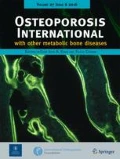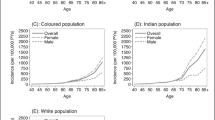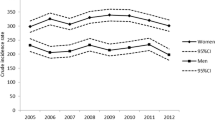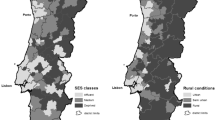Abstract
Summary
There was 75% variation in the trend in hip fracture incidence with age in women aged 50 to 85 in France. In southwest France, the women are at higher risk of hip fracture at younger ages. This finding should be taken into account when examining risk factors.
Introduction
Few studies have analysed the geographical variations in the relationship between age and hip fracture incidence. Our goal was to assess these variations among women under 85 within the same country.
Methods
The study population included women aged 50 to 85 who were living in France in 2004. Hip fracture cases were identified in the French Diagnosis Related Groups (DRG)-like database using the diagnosis code for closed hip fractures and procedural codes for treatment. The Moran index and a spatial model using latitude and longitude were used to assess the geographical heterogeneities of cumulative incidence risk (CIR) and age effect.
Results
A total of 29,218 hip fracture cases were identified. A south-to-north CIR gradient ranging from 7 to 16% was observed. The variation in the number of years until double hip fracture incidence was 75% (i.e. 1.49 to 2.57 years). In the south, and more markedly in southwest France, the women are at higher risk of hip fracture at a younger age.
Conclusion
The risk of fracture may be different between women of the same age. This may be hidden in a comparison of standardised ratios. This finding should be considered when examining risk factors and implementing public health interventions.




Similar content being viewed by others
References
Johnell O, Kanis JA (2004) An estimate of the worldwide prevalence, mortality and disability associated with hip fracture. Osteoporos Int 15:897–902
Kannus P, Sievanen H, Palvanen M, Jarvinen T, Parkkari J (2005) Prevention of falls and consequent injuries in elderly people. Lancet 366:1885–1893
Sambrook P, Cooper C (2006) Osteoporosis. Lancet 367:2010–2018
Goettsch WG, de Jong RB, Kramarz P, Herings RM (2007) Developments of the incidence of osteoporosis in The Netherlands: a PHARMO study. Pharmacoepidemiol Drug Saf 16:166–172
Jaglal SB, Weller I, Mamdani M et al (2005) Population trends in BMD testing, treatment, and hip and wrist fracture rates: are the hip fracture projections wrong? J Bone Miner Res 20:898–905
Papadimitropoulos EA, Coyte PC, Josse RG, Greenwood CE (1997) Current and projected rates of hip fracture in Canada. CMAJ 157:1357–1363
Kannus P, Niemi S, Parkkari J, Palvanen M, Vuori I, Jarvinen M (1999) Hip fractures in Finland between 1970 and 1997 and predictions for the future. Lancet 353:802–805
Lönnroos E, Kautiainen H, Karppi P et al (2006) Increased incidence of hip fractures. A population-based study in Finland. Bone 39:623–627
Baudoin C, Fardellone P, Thelot B et al (1996) Hip fractures in France: the magnitude and perspective of the problem. Osteoporos Int 6 [Suppl 3]:1–10
Elffors I, Allander E, Kanis JA et al (1994) The variable incidence of hip fracture in southern Europe: the MEDOS Study. Osteoporos Int 4:253–263
Ismail AA, Pye SR, Cockerill WC et al (2002) Incidence of limb fracture across Europe: results from the European Prospective Osteoporosis Study (EPOS). Osteoporos Int 13:565–571
Johnell O, Borgstrom F, Jonsson B, Kanis J (2007) Latitude, socioeconomic prosperity, mobile phones and hip fracture risk. Osteoporos Int 18:333–337
Kanis JA, Johnell O, De Laet C, Jonsson B, Oden A, Ogelsby AK (2002) International variations in hip fracture probabilities: implications for risk assessment. J Bone Miner Res 17:1237–1244
Schwartz AV, Kelsey JL, Maggi S et al (1999) International variation in the incidence of hip fractures: cross-national project on osteoporosis for the World Health Organization Program for Research on Aging. Osteoporos Int 9:242–253
Breslow N, Day NE (1987) Statistical methods in cancer research, vol II—the design and analysis of cohort studies. IARC, Lyon
Chang KP, Center JR, Nguyen TV, Eisman JA (2004) Incidence of hip and other osteoporotic fractures in elderly men and women: Dubbo Osteoporosis Epidemiology Study. J Bone Miner Res 19:532–536
Huusko TM, Karppi P, Avikainen V, Kautiainen H, Sulkava R (1999) The changing picture of hip fractures: dramatic change in age distribution and no change in age-adjusted incidence within 10 years in Central Finland. Bone 24:257–259
Lofman O, Berglund K, Larsson L, Toss G (2002) Changes in hip fracture epidemiology: redistribution between ages, genders and fracture types. Osteoporos Int 13:18–25
Couris CM, Duclos A, Rabilloud M et al (2007) A seventy percent overestimation of the burden of hip fractures in women aged 85 and over. Bone 41:896–900
Cliff A, Ord J (1981) Spatial processes: models and applications. Pion, London
O’Sullivan D, Unwin D (2002) Geographic information analysis. Wiley, New York
Hinton RY, Lennox DW, Ebert FR, Jacobsen SJ, Smith GS (1995) Relative rates of fracture of the hip in the United States. Geographic, sex, and age variations. J Bone Joint Surg Am 77:695–702
Karagas MR, Lu-Yao GL, Barrett JA, Beach ML, Baron JA (1996) Heterogeneity of hip fracture: age, race, sex, and geographic patterns of femoral neck and trochanteric fractures among the US elderly. Am J Epidemiol 143:677–682
Johnell O, Gullberg B, Kanis JA et al (1995) Risk factors for hip fracture in European women: the MEDOS Study. Mediterranean Osteoporosis Study. J Bone Miner Res 10:1802–1815
Becker C, Crow S, Toman J et al (2006) Characteristics of elderly patients admitted to an urban tertiary care hospital with osteoporotic fractures: correlations with risk factors, fracture type, gender and ethnicity. Osteoporos Int 17:410–416
Meyer HE, Berntsen GK, Sogaard AJ et al (2004) Higher bone mineral density in rural compared with urban dwellers: the NOREPOS study. Am J Epidemiol 160:1039–1046
Sanders KM, Nicholson GC, Ugoni AM, Seeman E, Pasco JA, Kotowicz MA (2002) Fracture rates lower in rural than urban communities: the Geelong Osteoporosis Study. J Epidemiol Community Health 56:466–470
Zingmond DS, Soohoo NF, Silverman SL (2006) The role of socioeconomic status on hip fracture. Osteoporos Int 17:1562–1568
Feskanich D, Willett W, Colditz G (2002) Walking and leisure-time activity and risk of hip fracture in postmenopausal women. JAMA 288:2300–2306
Robbins J, Aragaki AK, Kooperberg C et al (2007) Factors associated with 5-year risk of hip fracture in postmenopausal women. JAMA 298:2389–2398
McCabe LD, Martin BR, McCabe GP, Johnston CC, Weaver CM, Peacock M (2004) Dairy intakes affect bone density in the elderly. Am J Clin Nutr 80:1066–1074
Prince RL, Devine A, Dhaliwal SS, Dick IM (2006) Effects of calcium supplementation on clinical fracture and bone structure: results of a 5-year, double-blind, placebo-controlled trial in elderly women. Arch Intern Med 166:869–875
Conflicts of interest
None.
Author information
Authors and Affiliations
Corresponding author
Rights and permissions
About this article
Cite this article
Barbier, S., Ecochard, R., Schott, AM. et al. Geographical variations in hip fracture risk for women: strong effects hidden in standardised ratios. Osteoporos Int 20, 371–377 (2009). https://doi.org/10.1007/s00198-008-0687-y
Received:
Accepted:
Published:
Issue Date:
DOI: https://doi.org/10.1007/s00198-008-0687-y




